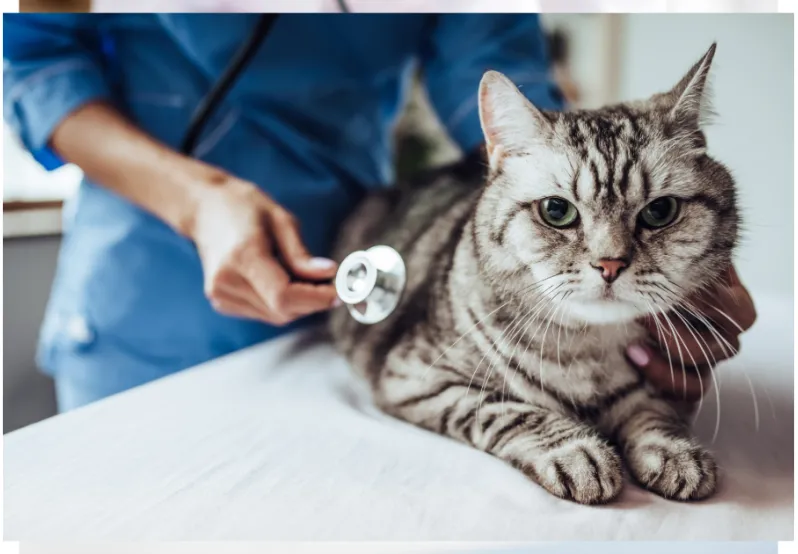Rapamycin clinical trial for cats with chronic kidney disease
Evidence exists to suggest that aging of the kidney may contribute to the onset and progression of chronic kidney disease (CKD). Rapamycin is a drug that is a known modulator of the aging process and additionally may decrease the formation of fibrosis (scarring) in the kidney. A feline formulation of the drug is available, and the purpose of this study is to assess the potential benefit of the drug in cats with CKD.

Client Compensation:
Your cat will receive complimentary assessment and management of disease by a board-certified specialist in feline CKD as well as standard of care laboratory monitoring regardless of study group. Cats randomized to the study drug group will possibly benefit from this therapy. There is no cost to you for enrolling your cat in this study. You will receive complimentary physical examination for your cat and diagnostic testing. You will also receive $25 per visit incentive.
Potential Medical Benefits:
Your cat will receive complimentary assessment and management of disease by a board-certified specialist in feline CKD as well as standard of care laboratory monitoring regardless of study group. Cats randomized to the study drug group will possibly benefit from this therapy.
Potential Medical Risks:
Your cat may experience transient stress of being in the hospital and mild discomfort of having blood drawn. If you cat is excessively stressed at any time, we will not continue with drawing the study samples. Gabapentin may be given to alleviate stress before proceeding. If this is not effective, we will discuss with you whether continuing the study is in your cat's best interest. A blood draw can result in bruising at the site of the blood draw. In rare cases, using a needle to collect urine directly from the bladder may result in hematuria, nausea or very infrequently bladder rupture. Your cat will be observed closely for side effects and appropriate medical care will be provided. Sedation is used for the abdominal ultrasound (this is normal even for cats not in a study) and risks of sedation may include prolonged lethargy or recovery time and highly unlikely, but still possible, decompensation of CKD or unexpected death. The feline formulation of rapamycin used in this study is also being used in a clinical trial of client-owned cats with heart disease at two other universities; no significant drug-related adverse events have been identified to date. In a previous pilot study, transient mild gastrointestinal upset (soft stools, decreased appetite, vomiting) was observed in a small number of cats receiving study drug.
What qualifies my pet for enrollment?
Inclusion Criteria:
Eligible patients (any breed of cats) must meet all the following:
Cats with stable IRIS stage 2 or 3
- CKD (serum creatinine ≥ 1.6 - 5 mg/dL) that are amenable to pill administration
- Must have a body weight> 2.2 kg (4.85 lbs.)
Exclusion Criteria:
Cats with congenital CKD (dysplasia or polycystic kidney disease), diabetes mellitus, other uncontrolled systemic illnesses.
- Complications of CKD such as kidney infection or ureteral obstruction.
- Moderate to severe anemia (PCV < 25%)
- Decompensated CKD requiring hospitalization and intravenous fluid therapy.
- Prohibited concurrent therapies include cyclosporine, cisapride, beta-blocking agents, antifungal agents, diltiazem and other medications that could affect rapamycin concentrations.
Other concurrent therapies such as dietary management, potassium supplementation, anti-hypertensive medications are acceptable if they were initiated at least 28 days prior to enrollment and are given consistently throughout the study period.
Diagnosis/Condition Being Studied:
Chronic Kidney Disease
Intervention to Be Studied:
Rapamycin
Primary Outcome:
Event(s) or variable(s) to be measured: Physical exam, blood, urine and blood pressure parameters.
Method(s) used to measure event(s) or variable(s): Four recheck visits (day 30,90,180 and 270) for a physical exam, blood and urine collection and blood pressure measurement.
Anticipated endpoint/outcome: Improvement in serum creatinine concentration.
PRE-SCREENING QUESTIONAIRE
If you believe your pet may be eligible for this study, please complete a pre-screening questionnaire.